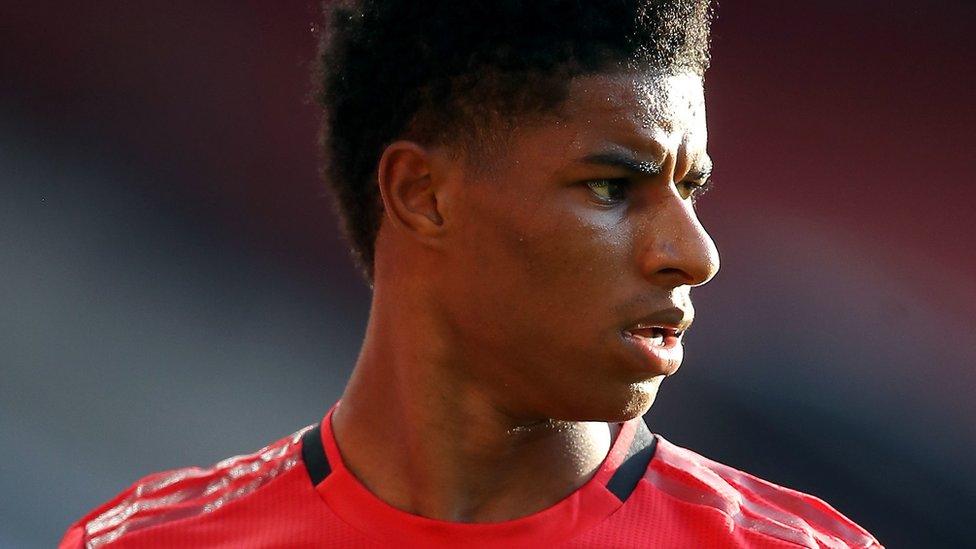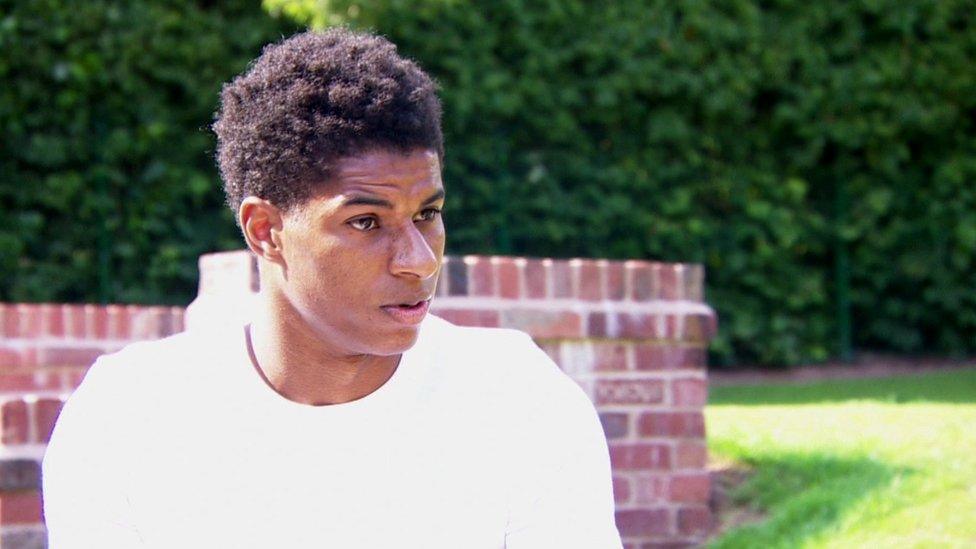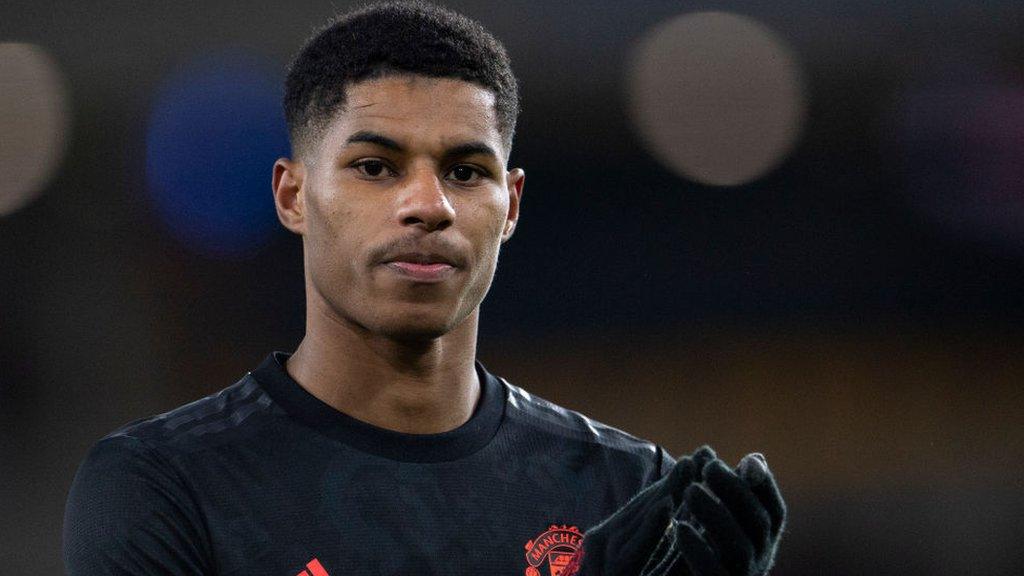Marcus Rashford 'disappointed' by government response on food poverty
- Published

Marcus Rashford said he is disappointed by the government response to his calls for more action on child food poverty.
The footballer said a letter from Education Secretary Gavin Williamson showed "a lack of empathy... towards protecting our most vulnerable".
Mr Williamson said the government was committed to supporting those in need, but did not fully back his Child Food Poverty taskforce.
Rashford, 22, is pressing MPs to go further in tackling hunger in families.
The Manchester United forward successfully campaigned to extend free school meals this summer, prompting a government U-turn on the issue.
"You should feel free, if you want to ask for help, to ask for help" - Rashford speaks to BBC Breakfast's Sally Nugent
Earlier this month, he continued his campaign, establishing a taskforce with some of the UK's biggest food retailers such as Tesco, Asda and the charity FareShare.
The taskforce is calling for three policy changes - recommended by the National Food Strategy review - to be funded by the government as soon as possible.
In a written response, Gavin Williamson highlighted existing government schemes to combat food poverty, including food parcels, voucher schemes and a summer food fund.
But the education secretary stopped short of throwing government support behind calls to expand free school meals to all households on Universal Credit - and two other key recommendations.
'I recognise that you and the Child Food Poverty Taskforce are supporting three of the recommendations in the National Food Strategy relating to food for lower income families.
"The government will carefully consider each of the recommendations in the report as we approach the next spending review."
'Issue of humanity'
Rashford, who showed Mr Williamson's letter to the BBC, said: "I am disappointed by the lack of empathy shown in recent weeks towards protecting our most vulnerable, the future of this country.
"I didn't have the education of a politician, I have never claimed to have all of the answers - but I have a voice and I will continue to use it for the millions who are not being heard.
"The drive of myself and the Child Food Poverty taskforce to see these three government policies implemented without delay is stronger than ever.
"I have no interest in party politics. Letting millions of children in the UK go hungry at night is only an issue of humanity.
"We need to do better."
Allow X content?
This article contains content provided by X. We ask for your permission before anything is loaded, as they may be using cookies and other technologies. You may want to read X’s cookie policy, external and privacy policy, external before accepting. To view this content choose ‘accept and continue’.
Conservative MP Robert Halfon, chair of the education select committee, described the government response to child food poverty as "a lot of clothes pegs without a washing line" - claiming individual food programmes, though welcome, were not enough - and a national strategy was required.
"What Marcus Rashford is doing is incredibly important because he is putting this issue into the national consciousness," he told BBC Breakfast.
Asked if the government response was too slow, Mr Halfon said: "It's a major social injustice that childhood hunger is going on in our country.
"The government needs to treat this with a real seriousness and make it a priority."
He urged the government immediately to extend free school meals across the school holidays, saying funds from the sugar tax would cover the cost and no additional money would be required.

The Child Food Poverty taskforce is pushing the government to fund three policy recommendations by the National Food Strategy:
Expanding free school meals to every child from a household on Universal Credit or equivalent, reaching an additional 1.5m children aged seven to 16
Expanding an existing school holiday food and activities programme to support all children on free school meals in all areas of England instead of the current 50,000 children that are helped
Increasing the value of the Healthy Start vouchers - which help parents with children under the age of four and pregnant women buy some basic foods - from £3.10 to £4.25 per week, and expanding it to all those on Universal Credit or equivalent, reaching an additional 290,000 people

Mr Rashford has previously described his successful summer campaign to extend free school meals as a "short-term solution" to stopping children going hungry, but said it "wasn't going to work in the long run".
"We have to think about the best way to do it, to think about how these families can eat long term and not have any issues," he said.
During the coronavirus lockdown in the spring, the government provided vouchers to families whose children qualify for free meals, but had insisted this would not continue into the summer holidays.
It prompted England footballer Rashford, who has spoken about his own experiences of using a food voucher scheme as a child, to write to MPs in June, calling on the government to reverse its decision.
The U-turn enabled about 1.3m children in England to claim vouchers over the holidays, with the support working out as about £15 a week for each child.

What is child food poverty and how many does it affect?
By Reality Check
The Department of Health defines food poverty, also referred to as food insecurity, as the inability to afford, or have access to food to make up a healthy diet
Last year, the government announced that it would start measuring food insecurity through its Family Resources Survey, external and that data would be available from 2021
Earlier this year, a YouGov poll commissioned by the Food Foundation suggested that 2.4 million (17%) children are living in food-insecure households., external
Poor nutrition is acknowledged to be a factor in children's performance at school and pupils whose parents receive certain benefits are eligible for Free School Meals. , external
In England, around 1.3 million children claimed Free School Meals in 2019 - about 15% of state-educated pupils.

- Published16 June 2020

- Attribution
- Published15 June 2020
